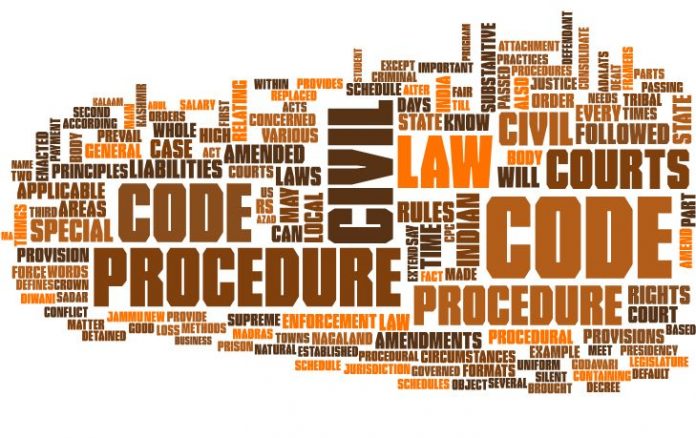This article is written by Monesh Mehndiratta, a law student at Graphic Era Hill University, Dehradun. This article provides the procedure where the defendant appears on the day of the adjourned hearing and gives a reasonable cause for his non-appearance at the previous hearing. It also mentions other Rules of Order 9 related to this matter.
This article has been published by Sneha Mahawar.
Table of Contents
Introduction
Imagine that you and your batchmate had a fight. You decide to complain about him to one of your teachers. The teacher, after listening to the matter from your side, calls your batchmate to give him an opportunity to present his side. He comes and presents his case. When the teacher is still listening to both of your arguments, she is called to do some urgent work. She asks you and your batchmate to come tomorrow. Now, as per the order of your teacher, you are present in front of her, but your batchmate is absent. What will you do in this situation? Will the teacher be able to resolve your fight? What if, in the absence of your batchmate, she decides to punish him?
The next day, when your batchmate asks the teacher, she punishes him for his misbehaviour with you. Now, do you think your batchmate must be given a chance to state a reason for his absence?
A similar situation occurs when the defendant in a civil suit is not present for the hearing. In such a situation, can the court proceed to pronounce a final judgement? Should the defendant be given a chance to prove his innocence? If he has a reasonable cause for his absence, will the court reconsider the decree passed against him in his absence on those grounds?
All these questions are dealt with in this article. The article talks about Order 9 of the Civil Procedure Code, 1908 (CPC), which deals with the appearance and non-appearance of the parties in a court hearing. Order 9 Rule 7-11 specifically provides the procedure to be followed in case a defendant does not appear for the hearing. It further provides a procedure to set aside an ex parte decree passed against the defendant in his absence. Let us now understand the Rules of Order 9 in this regard.
Order 9 CPC
We are all aware that there are two parties in a suit, i.e., the plaintiff and the defendant. Generally, both parties must be present in court for the hearing. But if, in any case, any of them is not present, Order 9 is applicable. This Order provides rules for the appearance of parties in a suit and also gives the consequences for their absence. According to Rule 1 of the Order, both parties must be present either personally or through their pleaders in the court on the day fixed in summons issued to the defendant.
Rule 2 further provides that if it is found that no summons were issued to the defendant due to the plaintiff’s fault, the suit will be dismissed by the court. In the case of Begum Para Nasir Khan v. Luiza Matilda Fernandes (1984), it was held that the fundamental rule of law states that every party must be given a fair opportunity to present their case. The service of summons is a means to serve this purpose. Therefore, no decree can be passed against the defendant if no summons has been issued to him, or, if he has not been given a chance to represent himself. The Order further provides the procedure when either of the parties is present. The present article mainly deals with the defendant under Rule 7 of Order 9 CPC.
Rule 7 of Order 9 CPC
Rule 7 provides the procedure in cases where the defendant was absent in the previous hearing but appears in the subsequent hearing and gives a reasonable or good cause for his absence in the previous hearing. It provides that in a situation where the court has adjourned the hearing of the suit ex parte and the defendant provides a good cause for his absence, the court, on its terms and conditions, may hear him and deal with the suit as if he had appeared on the date fixed for hearing.
In the case of Arjun Singh v. Mohinder Kumar (1964), the Supreme Court held that if the defendant is able to show any good or reasonable cause for his absence on the fixed day of the hearing, he will not be penalised or forbidden to participate in further proceedings. However, he cannot claim his position back as it was at the commencement of the trial. Rule 7 of Order 9 CPC is based on the principle that the defendant has a right to defend himself until the suit is completely decided by the court, and this must be understood liberally as held in East India Cotton Mfg. Co. Ltd. v. S.P. Gupta (1985).
Essentials of Rule 7
For the application of Rule 7 in a suit, the following essentials or conditions must be fulfilled:
- The defendant must not have appeared on the previous day fixed for the hearing.
- He should have a good or reasonable cause for his previous absence or non-appearance.
- The court must have adjourned the ex parte hearing in his absence.
- The court has discretionary power to order him to pay the costs or impose any other condition.
Other Rules related to Rule 7, Order 9
Rules 8, 9, 10, and 11 of Order 9 CPC deal with the defendant’s appearance or non-appearance. Let us understand them in detail.
Rule 8
According to this Rule, when the defendant appears but the plaintiff is absent on the day fixed for the hearing, the court will dismiss the suit by passing an order. But if the defendant admits any of the claims of the plaintiff, even in plaintiff’s absence, the court will pass an order against the defendant in favour of the plaintiff with respect to that particular claim and dismiss the remaining suit.
It is applicable only when there is one plaintiff and he does not appear for the hearing; if there is more than one plaintiff, all of them must be absent for this Rule to be applicable. If any one of them appears, then Rule 10 will be applicable. However, the suit cannot be dismissed in case the plaintiff was not able to appear because of a death in his family or relatives. This was held in the case of P.M.M. Pillayathiri Amma v. K. Lakshmi Amma (1967).
Rule 9
This provides that if a suit is dismissed according to Rule 8 of Order 9, the plaintiff is barred from instituting a fresh suit for the same cause, but he is allowed to file an application to set aside such an order of dismissal. But to get an order to set aside the order of dismissal of suit, he has to satisfy the court that there was a reasonable cause for his non-appearance on the day fixed for the hearing.
The court has the discretionary power to ask him to pay the costs or impose any condition in this regard. However, it is necessary for the plaintiff to prove that there was a reasonable cause for his non-appearance. The court while deciding the suit of dismissal must consider whether the plaintiff honestly tried to appear for the hearing on the fixed day or he was intentionally avoiding it (Motichand v. Ant Ram, 1952). This Rule further states that unless the other party has been informed through a notice, no order can be passed.
Rule 10
This rule envisages that where there are more than one plaintiff in a suit but only some appear on the day fixed for hearing, the court will proceed with the suit considering that all the plaintiffs have appeared for the hearing.
Rule 11
According to Rule 11, when there is more than one defendant in a suit and some appear but the rest do not, the court will carry out the proceedings, but during judgement, it may pass an order against those who did not appear. In such a situation, the court may pass a decree against or in favour of defendants who appeared, but it will be ex parte for those who did not appear.
Ex parte decree against the defendant
As given under Rule 7 of Order 9, the court will pass an ex parte decree in the absence of the defendant on the day of the hearing. But what if he appears on the next date of hearing and gives a good cause for his non-appearance? Will this decree against him be set aside?
These questions have to be considered carefully, and so according to Rule 7, if the court is satisfied with the cause given by the defendant, an ex parte decree will be set aside. Now the question that arises is: what is the procedure, and who can apply to set aside the decree? The answers to these questions lie in Rule 13 of Order 9 of the CPC.
Meaning of ex parte decree
A decree that is passed in the absence of the defendant against him on the day fixed for hearing but in the presence of the plaintiff is called an ex parte decree. This decree is neither null nor void and inoperative; rather, it is voidable unless it is annulled by the opposite party, i.e., the defendant, legally on valid grounds. Until then, it is operative and enforceable like any other decree and is covered under a valid decree. This was held in the case of Pandurang Ramchandra v. Shantibai Ramchandra (1989).
Procedure to set aside the decree
The procedure to set aside the ex parte decree is as follows:
- The application to set aside the decree can be filed by the defendant against whom it passed. In the case of more than one defendant, any one of them can do so. In case of his death, his legal representatives can file the application.
- This application must be filed in the court that passed this ex parte decree against him. However, if it is reversed or modified by a superior court, then the application must be filed in that particular court.
- The defendant has the burden of proving that there existed a reasonable and sufficient cause for his non-appearance and that he tried to appear but could not do so.
- While considering the application, the court has to consider whether the defendant honestly tried to appear or did not appear intentionally.
- After the satisfaction of the court about the existence of a reasonable and sufficient cause, it may set aside the ex parte order. In the case of Parimal v. Veena (2011), the Supreme Court held that while deciding the application to set aside the order, the court must follow a liberal approach and give reasons for setting aside the order.
- It must be noted that the court will not set aside the decree merely on the ground of irregularity in the summons if the defendant knew the date of the hearing and still did not appear.
Grounds and causes for setting aside ex parte decree against the defendant
There are two grounds for setting aside an ex parte decree. These are:
- Sufficient cause
- Failure to duly serve the summons to the defendant.
Illustration: X filed a suit against Y and Z in which an ex parte decree was passed against them. Later, it was found that Z had not been served the summons, and hence, the court had to set aside the decree against him, but Y had to give a reasonable and sufficient cause for his non-appearance to set aside the decree.
Sufficient cause
Whether a cause was sufficient enough to prevent the defendant from appearing in court on the day of the hearing must be decided on the basis of the facts and circumstances of each case. This was also observed by the court in the case of Salil Dutta v. T.M. and M.C. (P) Ltd. (1993).
Examples of sufficient cause recognised by courts so far are:
- A bonafide mistake of date;
- Delay in the arrival of the train;
- Disease or sickness of the defendant or counsel;
- Fraud;
- Death of a known person;
- Imprisonment;
- Strikes, etc.
Remedies available to the defendant
If an ex parte decree is passed against the defendant, he is entitled to the following remedies:
- File an application requesting the court to set aside the decree,
- He can make an appeal against such a decree as per Section 96 of the CPC.
- He can also file an application for review.
In the case of Bhanu Kumar Jain v. Archana Kumar (2004), the Supreme Court held that the remedies are concurrent in nature and can be used by defendants simultaneously.
Conclusion
Order 9 Rule 7 CPC clearly provides that in order to set aside the decree passed in the defendant’s absence, i.e., an ex parte decree, he has to give a good cause for his non-appearance on the day fixed for the hearing. The question to be considered in this regard is whether the rule of res judicata (according to this rule, if a suit is one decided by a competent court, it cannot be instituted by the same parties in the same court under the same jurisdiction for the same cause of action again) applies when an application is made to set aside the ex parte decree. It was observed that if the application made to set aside the decree is dismissed on legal grounds or merits, then the defendant will not be allowed to file a second application. In this situation, the rule of res judicata will apply. But if the dismissal is due to non-appearance or other circumstances, then a second application can be filed (Prahlad Singh v. Col. Sukhdev Singh, 1987).
It must be noted that Rule 7 gives the court discretionary power to order the defendant to pay costs for his non-appearance and impose terms or conditions as it thinks fit to proceed further with the proceedings. Whether the cause stated by the defendant is reasonable or sufficient is to be decided by the court individually based on the facts of each case. However, if a defendant files a separate suit in this regard, such a suit is not maintainable in court.
Frequently Asked Questions (FAQs)
What happens when neither party appears for a hearing?
According to Rule 3 of Order 9 CPC, the court will dismiss the suit if neither party appears on the day of the hearing fixed in the summons.
Is there any limitation period to file an application for setting aside an ex parte decree?
According to Article 123 of the Limitation Act, 1963, an application to set aside the ex parte decree must be filed within 30 days from the date of such a decree.
Can an ex parte decree passed against the defendant be revised?
According to Section 115 of the CPC, such a decree falls within the ambit of a decided case and therefore can be revised.
References
- https://www.writinglaw.com/order-9-rule-7-cpc/
- https://www.livelaw.in/news-updates/hp-high-court-order-9-rule-7-cpc-ex-parte-order-setting-aside-application-209336
- https://tilakmarg.com/opinion/appearance-of-parties-and-consequence-of-non-appearance-order-ix-of-cpc-practical-insights/#:~:text=Order%20IX%2C%20Rule%2013%20of%20the%20Code%20on%20one%20hand,cancellation%20of%20an%20ex%20parte
- https://blog.ipleaders.in/order-9-rule-13-cpc-1908/
- https://blog.ipleaders.in/appearance-non-appearance/
Students of Lawsikho courses regularly produce writing assignments and work on practical exercises as a part of their coursework and develop themselves in real-life practical skills.
LawSikho has created a telegram group for exchanging legal knowledge, referrals, and various opportunities. You can click on this link and join:
Follow us on Instagram and subscribe to our YouTube channel for more amazing legal content.
 Serato DJ Crack 2025Serato DJ PRO Crack
Serato DJ Crack 2025Serato DJ PRO Crack












 Allow notifications
Allow notifications


